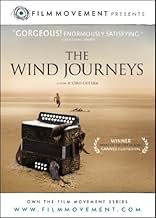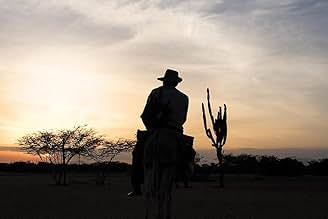IMDb RATING
7.4/10
2.6K
YOUR RATING
A musician travels a great distance to return an instrument to his elderly teacher.A musician travels a great distance to return an instrument to his elderly teacher.A musician travels a great distance to return an instrument to his elderly teacher.
- Awards
- 11 wins & 7 nominations total
Nibaldo Vergara
- Cowboy
- (as Nibaldo 'Niveo' Vergara)
- Director
- Writer
- All cast & crew
- Production, box office & more at IMDbPro
Featured reviews
Different to the classic Colombian movies. A journey throw the diversity of the Caribbean cost of Colombia, its people and its music.
Refreshing and well made.
It is very interesting that the lead actor is actually a well known Valletano singer. His songs a lot more popular than his funny name: Marciano.
The selection of songs along the movie is perfect. Traditional Vallenatos that this movie will always help to remember.
Ciro Guerra, the director, is making a great effort to show people around the world the most beautiful and forgotten places of the north region of Colombia.
Refreshing and well made.
It is very interesting that the lead actor is actually a well known Valletano singer. His songs a lot more popular than his funny name: Marciano.
The selection of songs along the movie is perfect. Traditional Vallenatos that this movie will always help to remember.
Ciro Guerra, the director, is making a great effort to show people around the world the most beautiful and forgotten places of the north region of Colombia.
A beautiful film that is in no hurry to unfold (and it shouldn't be because "being in a hurry" is not something the people in the movie seem to feel). Life is not easy here (you can see this etched into every character's face) but you persevere and along the way you look for, and create, beauty and kindness. I love the way the camera often moves backward, showing the characters moving from one environment into the next (they know where they're headed but we don't. The expressions on Fermin's face at the end are a complex wonder to behold (and a great topic for discussion afterward). If you are looking for an anxiety-inducing, misanthropic action-thriller then keep looking. If you want to see a poetic gem made by people who clearly see beauty in the world and know how to help us see it too, then settle down and enjoy "The Wind Journeys".
In short: Incomprehensible quest. Same applies to the ending.
Nevertheless, the movie is entertaining throughout and never boring. It shows customs and traditions that may seem alien to us here (NL), but were never unrealistic.
The accordion is not my favorite musical instrument, but that did not hinder me in appreciating the scenes and how they develop in time.
I must admire the younger main character for the trouble he takes to attempt rescuing his older counterpart in the movie. His undertakings seem unreal, and are certainly asking for trouble.
From half way the movie I was definitely missing the logic in the storyline, and was surprised how the story ends too.
Nevertheless, the movie is entertaining throughout and never boring. It shows customs and traditions that may seem alien to us here (NL), but were never unrealistic.
The accordion is not my favorite musical instrument, but that did not hinder me in appreciating the scenes and how they develop in time.
I must admire the younger main character for the trouble he takes to attempt rescuing his older counterpart in the movie. His undertakings seem unreal, and are certainly asking for trouble.
From half way the movie I was definitely missing the logic in the storyline, and was surprised how the story ends too.
there is a certain depth and a certain shallowness in this movie. i am going to speak about the first.
the little boy chasing his master is not supposed to be getting something explicit, as somebody commented here. the very fact that he has a nervous breakdown in the middle of the story, is enough teaching. As consequence, he tries his own path and is very bold in doing so. Although the story will not allow him to follow this type of courage yet, he does try. This is one of the most important things for him. Saying that I CAN DO IT.
the second thing the boy does get, although the average spectator does not seem to see this, is that the experience is not refused to him by his master. the master constantly taunts him, denies him, etc. as the boy says, but this is just a very select and appropriate way that this great master treats his maybe even greater apprentice. his art is no ordinary school, it's also a way of living, of understanding your place in society, etc. Although this seems very romantic and select, it's the way he does it, and not by being practical, sociable, etc.
the things that are not said or done are the most important. that's why a lot of people don't get this film at all. it's not for everybody. you must be a little rebel and also you must have already followed your rebellion a little in order to get the film.
the boy will also get a full image of his master by the end of the film, a master with many weaknesses, except his talent and spiritual endurance.
the ending has a very special atmosphere. it is a sentimental ending. the dead master teaches the living one a very nice lesson, through his living wife and children. the living one gets to teach the young apprentice a lesson, although still not very explicit (there is only one glaze into the apprentice eyes). it is the first time the master is not singing for money or in order not to get killed, and it is still not for such reasons as pleasure or love. it's a very special reason, or reasons. I see it as a duty.. art becomes a duty for those who are masters. it's not just money or entertainment or ordinary love. it's a duty to God, to true love, to life and to innocence.
i really like the way characters keep to their course in this classical movie, have some kind of modesty in them and are not very informed about the future. the mother sends the boy to the troubadour master, because she knows he can teach him things she cannot. the master itself does not control the situation very well, almost dies or is in the danger to die many times and always keeps this side of him in which he himself is an appearance. The boy is the most risk assuming character, more appropriate to his age, and manages to do well in very difficult situations, like a hero, but without really knowing where he heads to. He admits that in front of a woman who asks him why he made all this long journey. He sincerely admits 'I don't know'.
the director himself portrays beautifully a lot of situations and traditions in which life or beauty surpasses logic and when he himself would admit the same thing as the boy: 'I don't know'
the little boy chasing his master is not supposed to be getting something explicit, as somebody commented here. the very fact that he has a nervous breakdown in the middle of the story, is enough teaching. As consequence, he tries his own path and is very bold in doing so. Although the story will not allow him to follow this type of courage yet, he does try. This is one of the most important things for him. Saying that I CAN DO IT.
the second thing the boy does get, although the average spectator does not seem to see this, is that the experience is not refused to him by his master. the master constantly taunts him, denies him, etc. as the boy says, but this is just a very select and appropriate way that this great master treats his maybe even greater apprentice. his art is no ordinary school, it's also a way of living, of understanding your place in society, etc. Although this seems very romantic and select, it's the way he does it, and not by being practical, sociable, etc.
the things that are not said or done are the most important. that's why a lot of people don't get this film at all. it's not for everybody. you must be a little rebel and also you must have already followed your rebellion a little in order to get the film.
the boy will also get a full image of his master by the end of the film, a master with many weaknesses, except his talent and spiritual endurance.
the ending has a very special atmosphere. it is a sentimental ending. the dead master teaches the living one a very nice lesson, through his living wife and children. the living one gets to teach the young apprentice a lesson, although still not very explicit (there is only one glaze into the apprentice eyes). it is the first time the master is not singing for money or in order not to get killed, and it is still not for such reasons as pleasure or love. it's a very special reason, or reasons. I see it as a duty.. art becomes a duty for those who are masters. it's not just money or entertainment or ordinary love. it's a duty to God, to true love, to life and to innocence.
i really like the way characters keep to their course in this classical movie, have some kind of modesty in them and are not very informed about the future. the mother sends the boy to the troubadour master, because she knows he can teach him things she cannot. the master itself does not control the situation very well, almost dies or is in the danger to die many times and always keeps this side of him in which he himself is an appearance. The boy is the most risk assuming character, more appropriate to his age, and manages to do well in very difficult situations, like a hero, but without really knowing where he heads to. He admits that in front of a woman who asks him why he made all this long journey. He sincerely admits 'I don't know'.
the director himself portrays beautifully a lot of situations and traditions in which life or beauty surpasses logic and when he himself would admit the same thing as the boy: 'I don't know'
I'm a frequent visitor to Colombian's northern coast and this film shows this region very well.
By the film's title and subject, I was not expecting an action film, I knew it would move slow. Maybe because of my low expectations I found this film truly wonderful! The film shows the great variety of the region and its people. The different languages and accents. The mountain and river scenes were great. The regions of Magdalena, César and Guajira are beautifully depicted.
The story was good enough for me. I liked the questions that are left unanswered. But clearly, for me, the scenery more than carried this film.
By the film's title and subject, I was not expecting an action film, I knew it would move slow. Maybe because of my low expectations I found this film truly wonderful! The film shows the great variety of the region and its people. The different languages and accents. The mountain and river scenes were great. The regions of Magdalena, César and Guajira are beautifully depicted.
The story was good enough for me. I liked the questions that are left unanswered. But clearly, for me, the scenery more than carried this film.
Did you know
- TriviaColombia's official submission to 82nd Academy Award's Foreign Language in 2010.
- ConnectionsFeatured in TCM Guest Programmer: Patton Oswalt (2013)
- How long is The Wind Journeys?Powered by Alexa
Details
- Release date
- Countries of origin
- Official site
- Language
- Also known as
- L'Accordéon du diable
- Filming locations
- Production companies
- See more company credits at IMDbPro
Box office
- Gross worldwide
- $10,988
- Runtime
- 1h 57m(117 min)
- Color
- Sound mix
- Aspect ratio
- 2.35 : 1
Contribute to this page
Suggest an edit or add missing content





















